The Stolen Heritage: Decoloniality and Questioning Privilege as Embodied Practices through the research project LA PAROLA AI CORPI

A piece of collective writing by Amanda Homa, Itzel Sandoval Valladares, Laura Jansen, Micaela Castrillo Vargas, Carlos Landaeta Meneses, Simone Di Biagio, Thiago Souza, Giulia Aleandri, Gaia Vimercati.
As an introduction to what follows, let me (Amanda) set the context in which these worlds emerged. First, what you’ll read after this introduction is the result of a collective writing exercise/performance that lasted three hours. It took place as part of the opening of the project LA PAROLA AI CORPI on November 9, 2024, at Fabbrica del Vapore in Milan, Italy.
LA PAROLA AI CORPI is a project conceived by Gaia Vimercati (supported and produced by the association Quattrox4, a contemporary circus centre founded in Milano in 2011.) Its central aim is to create a space for a week-long exploration with a group of seven artists, Gaia herself, and an invited co-curator. Together, they work on ways to overcome the binary between theory and circus practices through embodied knowledge. The project began in 2021, and each edition is framed by a theme selected by Gaia.
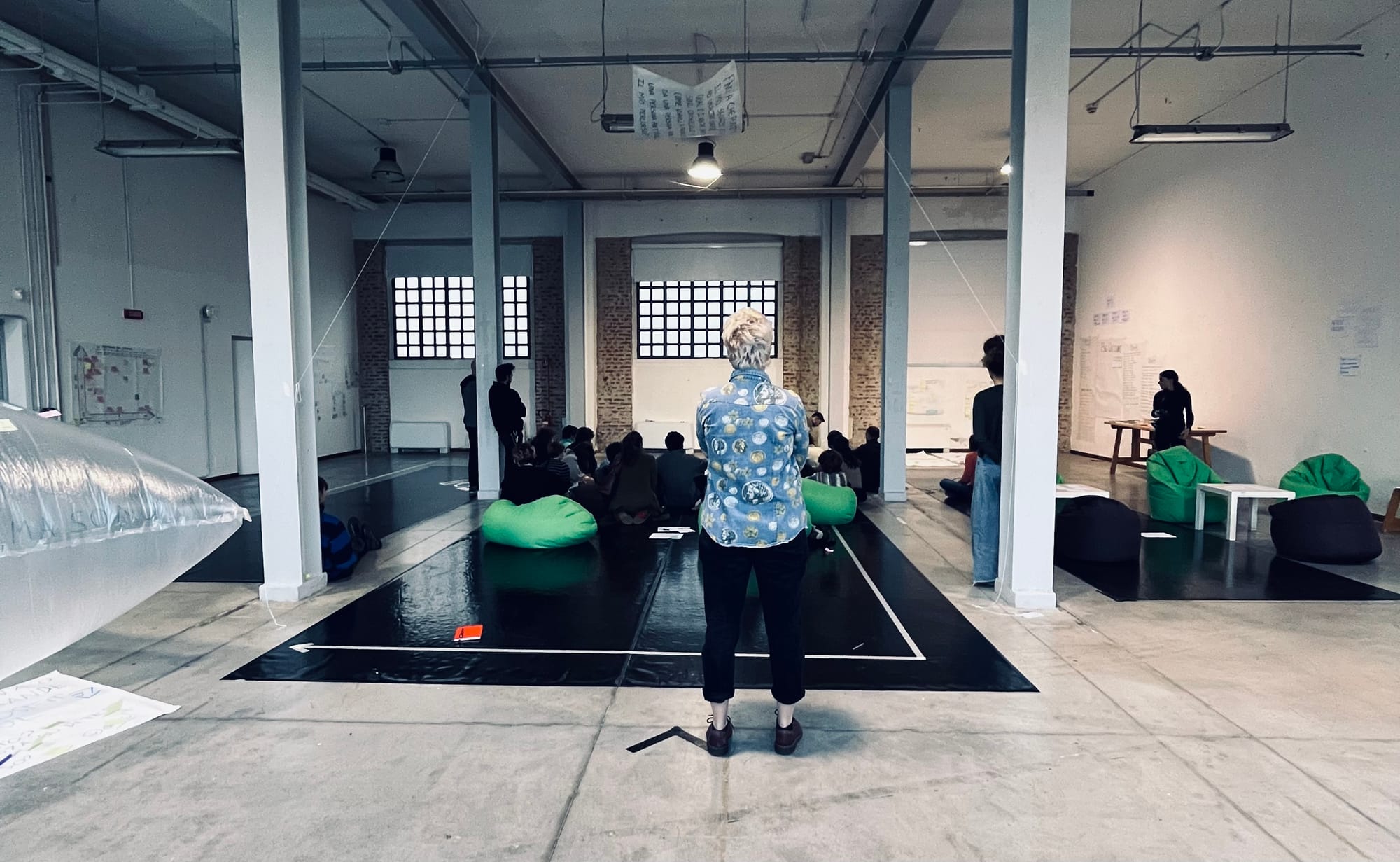
In 2024, I was invited to co-curate the fourth edition with her. The theme for this year was (De)coloniality and Privilege (in the circus field).
So here we are, on the final day of a week-long process. Over the week, we delved deeply into topics, such as trust, resisting hegemony, (de)coloniality, subaltern studies, self-love, self-care, eros in creation and political resistance, and art as a profession. Our approach involved exploring these subjects through a combination of tools: spatial dynamics, group interactions, extensive discussions, occasional writing, active listening, movement, shared practices, daily moments of silence, and a special five-minute dancing/partying at the end of every session.
For us, “breaking the binary” meant finding ways to articulate the knowledge held by our bodies and linking it to theoretical frameworks. We aimed to identify theories that resonated with embodied experiences—those we intuitively understand and that have shaped our paths, consciously or not.
Looking back, it now feels like we were playing a memory card game. Throughout the week, we laid out as many “cards” as possible—ideas, theories, experiences—and randomly flipped them over, searching for matches. Sometimes the first “card” was theory; other times, it was an experience. This game seemed, in some way, like an answer to the desire to break the binary between circus practices and theory. It offered a way to reclaim the concept of “knowledge,” which is often narrowly associated with academic work. Simultaneously, it helped us avoid the all-too-common trap of dismissing academic work entirely in defence of the value of embodied, craft-based, experiential learning.
Using the metaphor of kintsugi—the Japanese art of repairing broken pottery with gold—breaking the binary meant connecting two perspectives on the same subject and discovering where they could bond and where the gold was hidden.
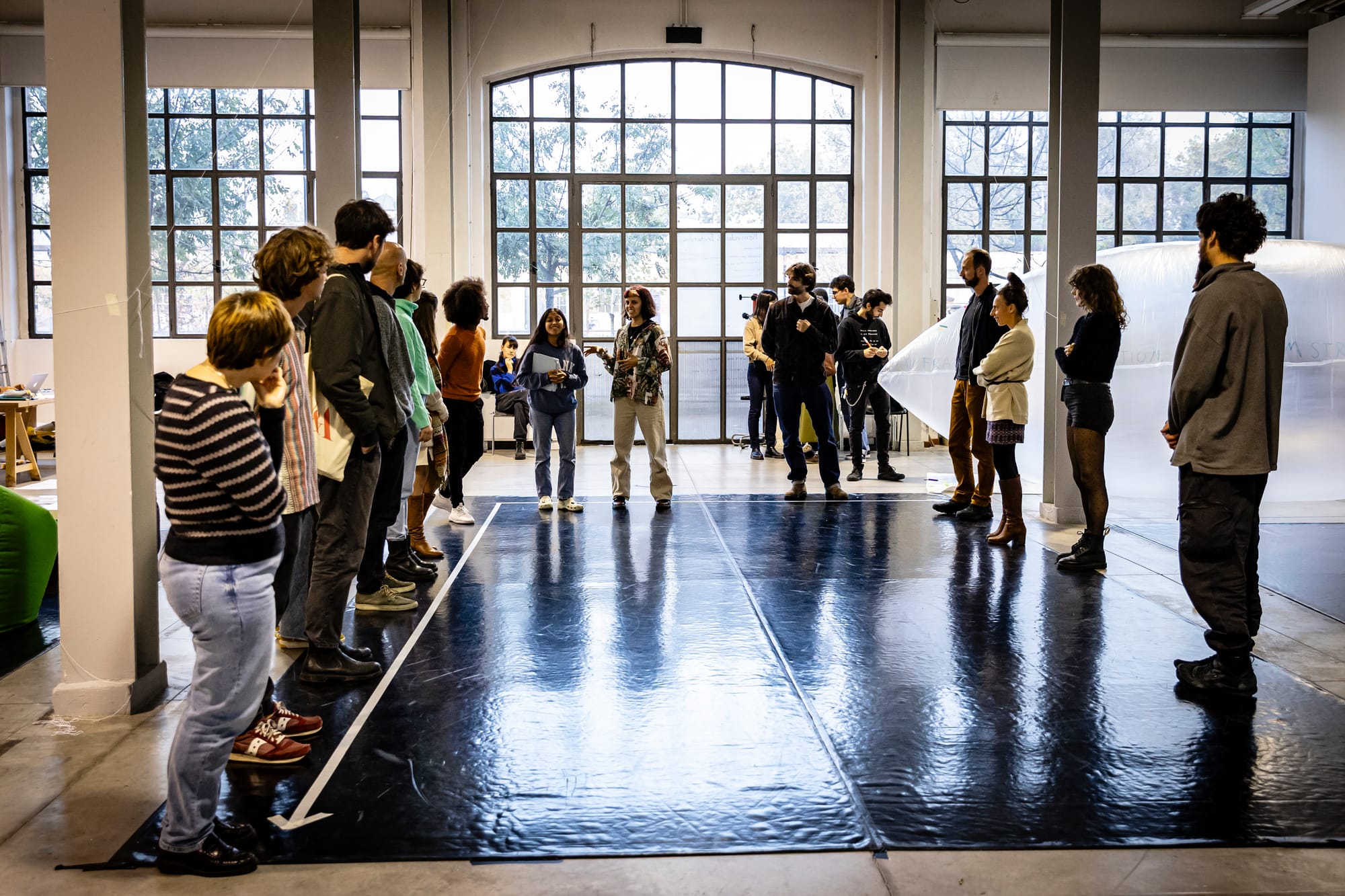
So here we are, at the opening. A moment to physically and conceptually open the space to others who had not been with us all week. This included people we had invited, as well as curious passersby willing to join and observe. Many things happened during those three hours, one of which was a performance intended to create a text that would later be published and, hopefully, read by a broader audience—a text to gather and reflect on some of the thoughts and experiences from the week.
This was no easy task, but one we were ready to tackle. The group collectively decided (in one of our many discussions) to approach the writing together, as it felt important to share the opportunity to occupy this space with every participant willing to do so. Remarkably, everyone was on board.
Gaia and I proposed an alternative version of an exercise called Relay Dialogue. In our adaptation, the text began with a question chosen by us. Any participant willing to answer would sit at the computer and write a response of about ten lines within a 15-minute time limit, ending their contribution with a new question for the next person. This sequence continued until time ran out.
We chose this protocol for several reasons. One was its emphasis on randomness and connectedness—elements that, to me, are intrinsic to political engagement. In political work, evolution is often random; your involvement depends on what came before you, while what comes next may alter everything beyond your control unless you choose to re-engage. For such a substantial topic, we wanted to challenge the notion of controlling ideas and concepts. Achieving something precise and powerful through a collective voice would have required far more time than we had, so we designed the protocol to help resist these pressures and keep the process simple and grounded.
Our goal was to demonstrate that engaging in discussion—even without total knowledge—is an essential and generous act. It involves sharing ideas, posing questions, and moving forward, even when the endpoint is unclear. No single person could dictate the direction, but we were collectively determined not to accept the status quo.
Another reason this protocol felt right was its structure. By punctuating the text with questions, each contribution concluded with an invitation to reflect. These questions often revealed as much as the responses themselves. They highlighted how we were navigating complex issues, offering a transparent glimpse into our thinking process.
As co-curator, I felt it was crucial to show that, above all, we were questioning—ourselves, the world around us, and the systems we operate within. We wanted to encourage readers to join this dialogue and raise questions about the current state of the circus field and its surrounding mentalities. Hopefully, spaces like this will inspire others to share their thoughts, questions, hypotheses, and propositions, continuing the cycle of inquiry and exploration.
So here we are, the resulting text. As you read it, we invite you to consider the Invitations & Reminders that hung on our wall throughout the week:
- Your judgment is shaped by your own experiences and values
- Try to recognize your emotions
- Receive it with acceptance and humility
- Embrace discomfort
- Use discomfort as a way in, not as a way out
- Practice radical honesty
- Remember to drink water and take care of yourself
After spending seven days with a group of artists in a professional context—where, for once, I was not a minority in the room because of being an immigrant and non-white, a situation that is weirdly rare for me—I felt an urge to share our thoughts and feelings about this reality. It’s something we can be highly aware of, yet remain surprisingly passive about.
So the question that came to my mind was…
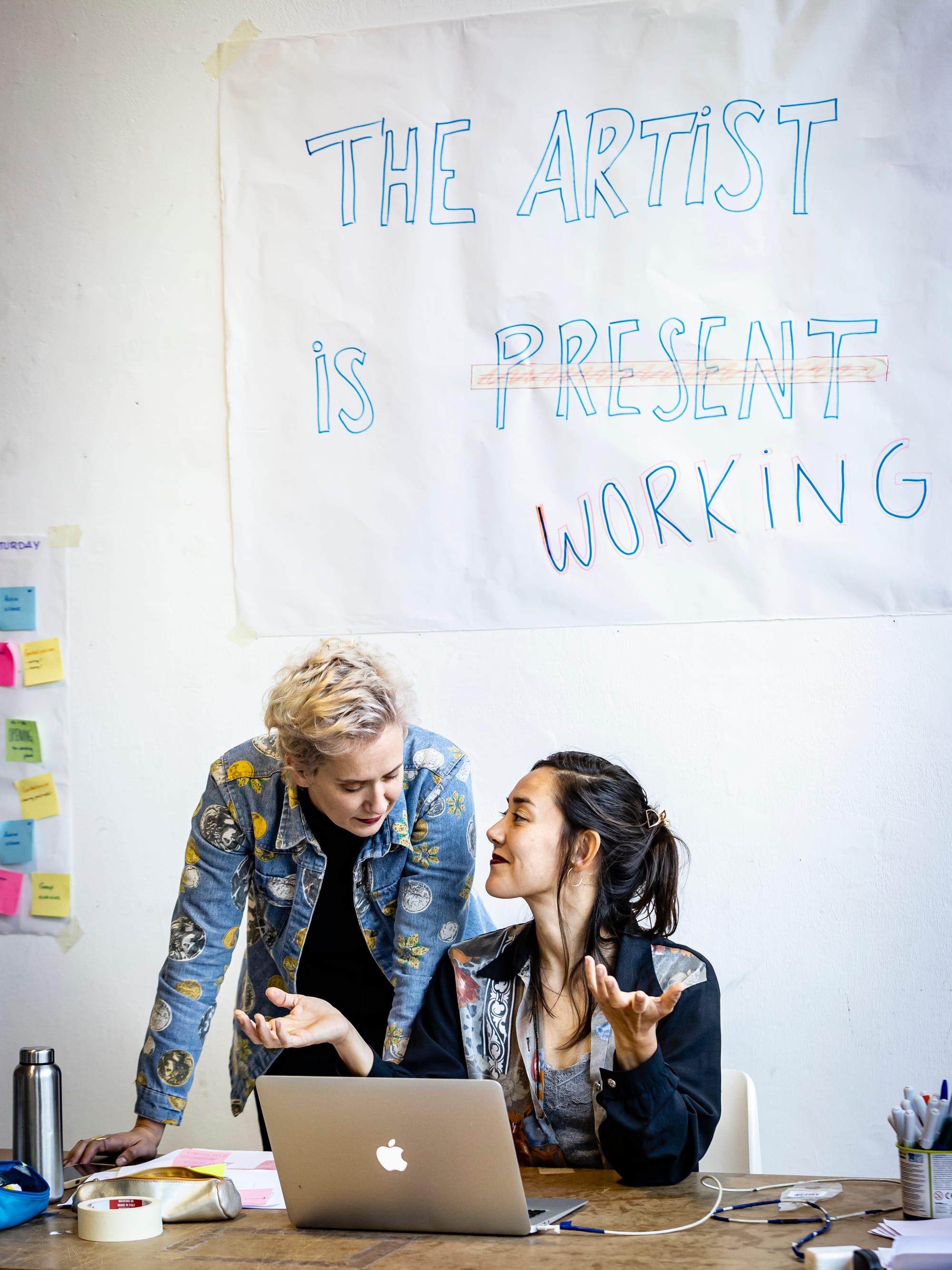
As a non-European artist living and working in Europe, what do you regret but feel powerless to change?
Itzel: Como una artista no europea, al finalizar mis estudios me sentí puesta a un lado, como un caso aislado. Al ser la única de mi clase sin un pasaporte europeo, sentí que tenía preocupaciones más grandes que abarcaban mi vida entera y no tenía tiempo suficiente para solucionarlas. Existe una gran presión sobre encontrar, cumplir expectativas, seguir creando, entrenar, no perder lo ganado, sobrevivir y conseguir un visado antes de que se te acabe el anterior.
Al graduarme descubrí que un trabajo como artista me ofrecería un contrato a corto plazo, lo que tampoco era una respuesta para establecerme en un lugar. Al no ser de aquí, no tenía un red de contactos ni una carrera construida, lo que me hacía sentir impotente por no tener las mismas oportunidades que mis compañeros
Yo se que esto puede ser un “sueño” pero me gustaría que hubiera más oportunidades para quienes necesitan un contrato de más de cuatro meses y compartimos urgencias por compartir y aportar…
Itzel: As a non-European artist, at the end of my studies, I felt put aside, like an isolated case. As the only one in my class without a European passport, I felt I had bigger concerns that encompassed my whole life and not enough time to deal with them. There is a lot of pressure on finding opportunities, meeting expectations, continuing to create, training, not losing what you have earned, surviving and getting a visa before your old one runs out.
When I graduated I discovered that a job as an artist would offer me a short-term contract, which was also not an answer to settling in one place. Not being local, I didn't have a network or a career built up, which made me feel powerless for not having the same opportunities as my peers.
I know this may be a ‘dream’ but I wish there were more opportunities for those of us who need a contract of more than four months, and share an urgency to express and contribute to the discourse…
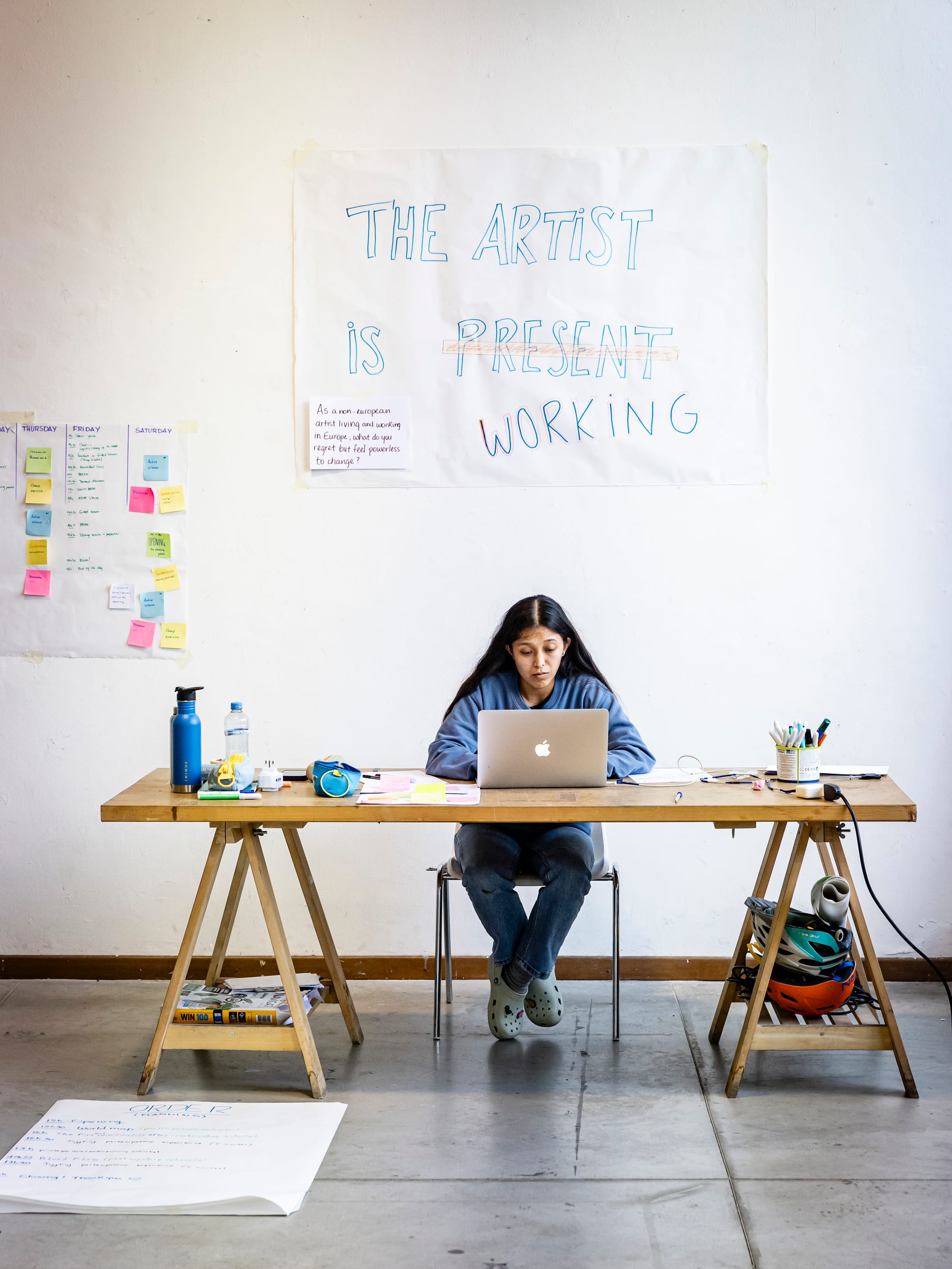
Is it a privilege to be an artist?
Laura: I think that many people who don't call themselves artists are actually artists. I believe that a privileged part of our society has taken the word artist and tried to make it this exclusive thing. There is too much mystery surrounding the word artist. Earning your living and being an artist are two different things. I think that there is also a Western standard of beauty that maybe makes people feel like they can't put themselves in the artist's box. Maybe some people believe that they have to do a certain set of things before they can call themselves an artist. For me, however, it feels like a privilege that many correct circumstances happened that led me to be able to call myself an artist. I first started calling myself an artist after my first experience working with a dance teacher who was the first person in my life to believe in me and let me know that they believed I was intelligent, creative and capable. But it is an undeniable privilege that I had the money to afford that dance class in the first place. So many people are artists but there are undeniably barriers to a person's art becoming visible enough that they can live from it. But also there is an issue for example of people's willingness to accept art that is not “intelligent art”. For example, my friend's mom spent 5000$ on a Picasso print. Why? How many alive artists could she have supported with that money? But of course, it's not about that for her. For her, that Picasso print is a status symbol. I wish I could convince people with resources to support more emerging artists, street artists and student artists. But at the same time, lots of these artists were not very privileged when they were alive. So I guess it's complicated and all contextual just like everything else in life.
What is the artists’ place in the revolution our world needs?
Micaela: I think the artist has the power to open conversations among other people who would usually not question themselves on certain topics, and also to give voice to the silenciadas (“silenced”) voices. The artist can flip the power dynamic for a short moment, I believe when the audience goes to a performance, they go, at least their first minutes, with the will to hear/watch the art; the audience is on your side, and they are going with receptiveness. Then, how to use that? Because I believe everything is political, and artists have the responsibility, and the power, to visibilizar (“make visible”) situations. In this world, being an artist comes with privileges; we need to be careful to use them. Therefore, as artists we can (and maybe should) improve and broaden our cold knowledge; be informed about the world situation; use them as tools to express ourselves artistically. Summarising: staying honest, staying sensitive, staying informed, staying strong (always acudir a comunidad, la revolucion es colectiva).
Is the voice of every artist heard?
Carlos: more than finding a clear answer closer to the truth, I find it pertinent to dig into what could be the conditions that generate imparity and that accentuate the difference of volume on which artists are heard or not, be heard can be very directly connected on how high in a certain hierarchy you will be found. Un/fortunately it is out of my control and I directly associate “to be heard to: be supported, performing comfortably, and not being in a rush or having difficulty creating any artistic manifestation. So pragmatically and simplistically: I’ll say No, not every artist is heard. This question works paradoxically to investigate and research more in the openness of the field of art and the accessibility to create (professionally or not). Let’s check institutions, especially their discrimination standards, biased policies and active rejection of mechanisms of oppression.
What are the actions we could take to fight/ stand back to “Positive Discrimination”?
Simone: da uomo bianco che spesso si è trovato nella posizione di vantaggio posso dire che l’informazione, la curiosità e l’apertura mentale sono necessarie per decostruire un atteggiamento tossico come questo. Ahimé mi è capitato anche di fare del “positive discrimination” anche quando non sapevo che lo stavo facendo. Dalla mia esperienza, chiedere il perchè ed essere umili di chiedere è l’unico modo per poter vedere tanti atteggiamenti “fantasma” che ereditiamo. Circondarsi di persone diverse dal proprio sé è un altro requisito fondamentale per correggere questi bias. Correggere le persone che ti circondano per creare consapevolezza è un altro modo per creare discussione e confronto. Come vorrei essere corretto quando faccio un errore, altrettanto sento di voler prendere la responsabilità di correggere l’altro se c’è qualcosa che stona nel suo atteggiamento. Come in tutte le cose il silenzio non porta a nulla di buono. Bisogna armarsi di assertivismo per poter creare dialogo e portare tutte e tutti in un altro stadio di consapevolezza, senza paura del confronto e dello scontro.
Simone: As a white man who has often been in a position of advantage, I can say that information, curiosity and open-mindedness are necessary to deconstruct a toxic attitude like this. Alas, it has also happened to me to make ‘positive discrimination’ even when I did not know I was doing so. From my experience asking why, and being humble to ask, is the only way to see so many ‘ghost’ attitudes that we inherit. Surrounding yourself with people, other than yourself, is another prerequisite for correcting these biases. Correcting the people around you to create awareness is another way to create discussion and confrontation. Just as I want to be corrected when I make a mistake, I also feel that I want to take responsibility for correcting the other person if there is something wrong with their attitude. As in all things, silence does not lead to anything good. We must arm ourselves with assertiveness to create dialogue and bring everyone to another level of awareness, without fear of confrontation and confrontation.
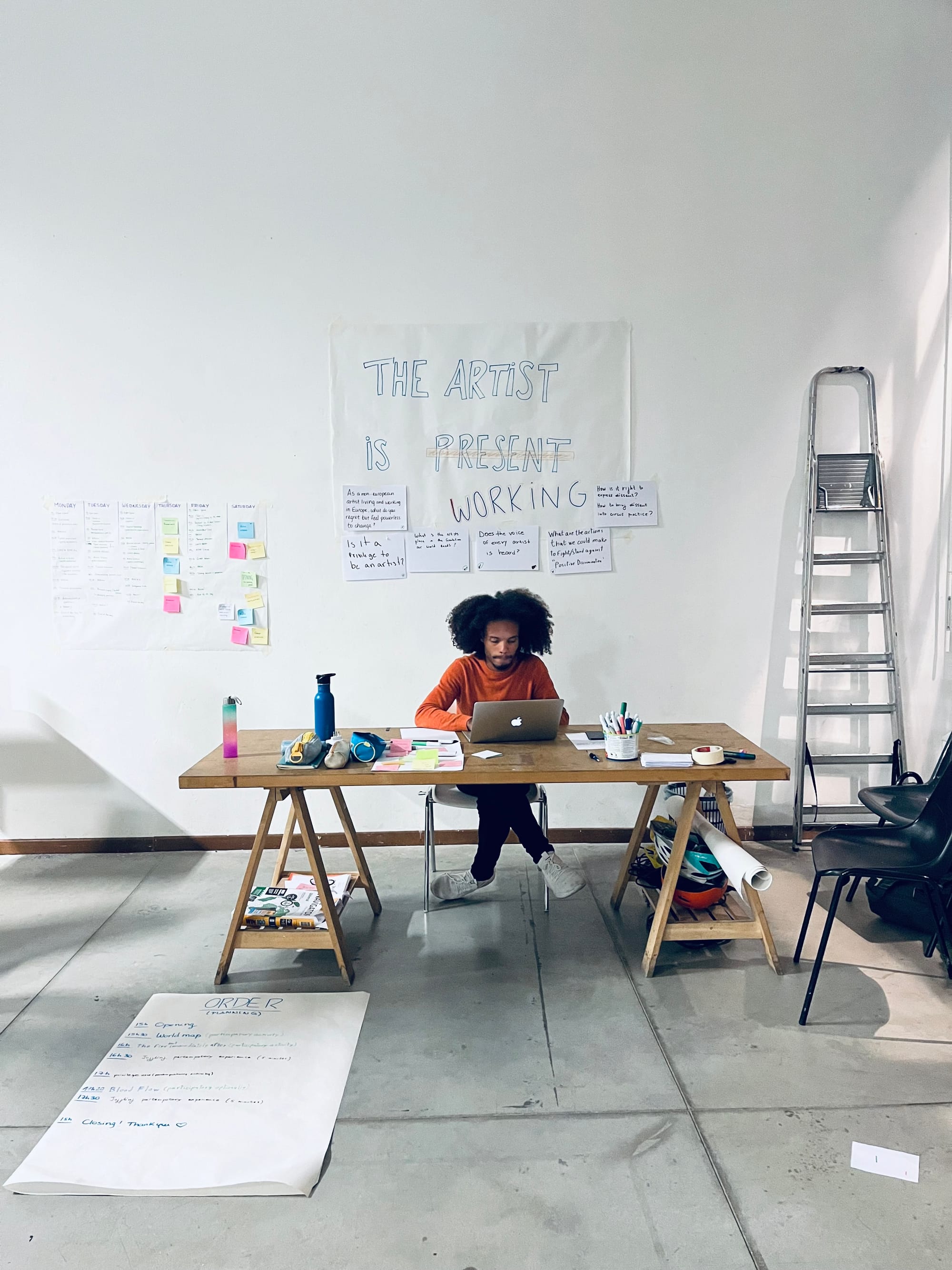
How is it right to express dissent? How to bring dissent into circus practice?
Thiago: Julgo impossível encontrar uma única maneira justa. Entendo que para manifestar um desacordo deve-se antes de mais nada compreender se há a possibilidade de fazê-lo. E posteriormente, se possível, entender como utilizar esse, ainda que pequeno, privilégio. Vozes/corpos quase sempre silenciados nem sempre possuem essa possibilidade. Assim, parto da premissa de que para compreender como manifestá-lo faz-se necessário o discernimento da(s) relação(es) hierárquicas no qual esse desacordo acontece. Ao fazer tal assimilação, julgo que são inúmeras as ferramentas que possibilitam essa manifestação. Desde um silêncio/fuga até um enfrentamento direto através de um discurso argumentativo e justificativo. No qual, acredito que as habilidades de compreensão do ouvinte devem ser levadas em consideração. É dizer, por exemplo: Como um homem, negro, sudamericano, posso explicar o meu disacordo à um homem branco europeu, sobre seus privilégios, quando este provável ainda nunca assimilou seus privilegio ganhados mas insiste no mito da meritrocacia? Na prática circense, acredito não haver uma distância da resposta anterior, uma vez que parto do princípio que esta, assim como outras práticas, não podem ser desassociadas da ‘vida social’.
Thiago: I think it's impossible to find a single fairway. I believe that to express disagreement, one must first understand whether there is the possibility of doing so. And then, if possible, understand how to utilise this, albeit small, privilege. Voices/bodies that are almost always silenced don't always have this possibility. Thus, I start from the premise that in order to understand how to manifest it, it is necessary to discern the hierarchical relationship(s) in which this disagreement takes place. In making this assimilation, I believe that there are countless tools that make this manifestation possible. From silence/leakage to direct confrontation through argumentative and justificatory discourse. I believe that the listener's comprehension skills must be taken into account. For example: how can a black, South American man explain my disagreement with a white European man about his privileges, when he has probably never assimilated his earned privileges but insists on the myth of meritocracy? In circus practice, I believe there is no distance from the previous answer since I assume that this, like other practices, cannot be disassociated from ‘social life’
Which practices in the circus field make it possible to recognise the colonisation heritage? How can we rethink them?
Giulia: Parlando da un punto di vista circense, ma aprendo la riflessione all’intera pratica performativa, una delle cose che mi viene in mente è la rappresentazione. Ontologicamente lo spettacolo mostra la rappresentazione di una verità rielaborata dall’artista che sta performando. Questa è la magia della macchina dello spettacolo, dare visibilità a qualcosa, accendere i riflettori su qualcosa che altrimenti potrebbe passare inosservata. Talvolta però sento, da europea, bianca, abile e cisgender che si da visibilita’ “prendendo in mano il microfono”, mostrando cioe’ la questione attraverso la nostra voce, il nostro punto di vista. Senza cattive intenzioni, a volte, ma prodigandosi come portabandiera di una lotta non nostra. Sarebbe un buon esercizio cercare di non occupare degli spazi che sappiamo non appartenerci, e prodigarsi, invece, per far in modo che questi spazi siano occupati da persone/artist* che appartengano a quella cosa, che sentano quell’eros che si muove dentro di loro e che siano visibilizzati come artist* agenti, responsabili del loro pensiero, intermediari della loro riflessione, rappresentanti del loro vissuto.
Giulia: Speaking not only from a circus point of view but opening the reflection to the whole of performance practice, one of the things that comes to mind is representation. Ontologically, the performance shows the representation of a truth reworked by the artist who is performing. This is the magic of the performance machine, to give visibility to something, to turn the spotlight on something that might otherwise go unnoticed. Sometimes, however, I feel, as a white, cisgender European, that we give visibility by ‘taking over the microphone’, that is, by showing the issue through our voice, our point of view. Without bad intentions, sometimes, but by being the standard-bearer of a struggle that is not our own. It would be a good exercise to try not to occupy spaces that we know do not belong to us, and to strive, instead, to ensure that these spaces are occupied by people/artists* who belong to that thing, who feel that eros moving within them and who are visible as artist* agents, responsible for their thought, intermediaries of their reflection, representatives of their experience.
Which tools have art to engage the audience in a non-passive way, but creating a feeling of “discomfort” useful for reflection?
So, here I am (Gaia), and as the designer of this project and the only one who has experienced it more than once, I can say that The Stolen Heritage was the first and only time in my professional life I was a number minority because of my racial identity. And this has brought to me mixed – and sometimes colliding - feelings because as a non-straight woman living and working in the circus in Italy, I have always seen one side of the coin and told myself one page of the story: the oppression that I was suffering, not the oppression that I was delivering.
There is a quote by Audre Lorde that has accompanied me since the first time I conceived LA PAROLA AI CORPI:
“For the master’s tool will never dismantle the master’s house. They may allow us temporarily to beat him at his own game, but they will never enable us to bring about genuine change.”
(Lorde, Audre. The Master’s Tools Will Never Dismantle the Master’s House in Sister Outsider: Essays and Speeches. Ed. Berkeley, CA: Crossing Press. 1984. P. 110- 114. 2007. Print.)
When I designed this project I asked myself: which is the House that I want to dismantle? Where is the Master in me? They were questions I didn’t know how to answer but kept as open as I could and each year I try answering with different tools.
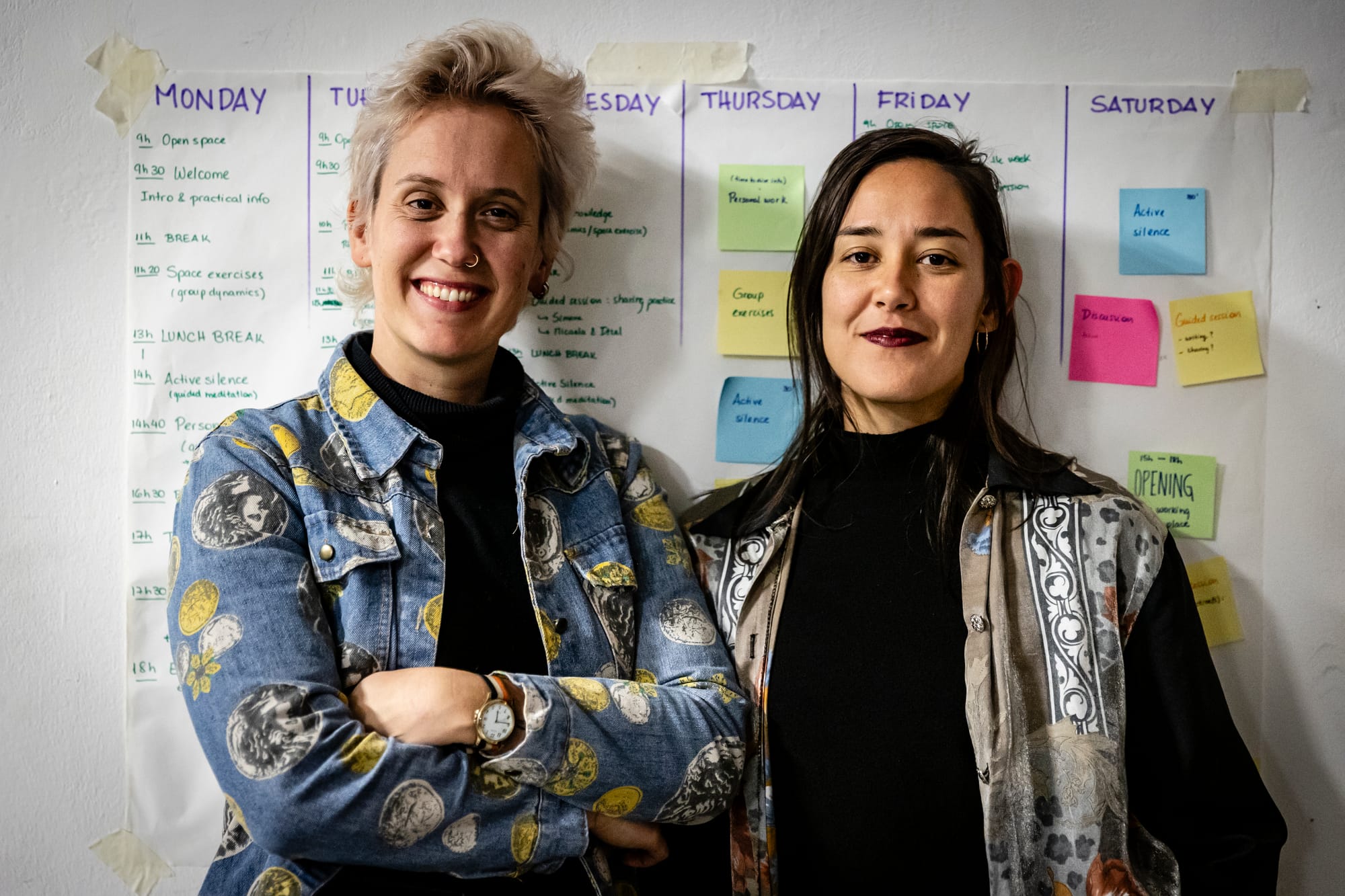
So here we are, as co-curators together…
LA PAROLA AI CORPI this year showed us that there are always two sides of the discourse: the individual and the group. Our “will to change” as individuals, and to be available for questions, and the group as a force to welcome our contradictions and question them, encompass our strengths, let us embrace them anew, and keep growing as loving persons.
If there is a thing, among the innumerable ones, that will stay with us from this week, that is to consider CARE not as a noun but as a verb, not a discourse but an ongoing action that needs practice. Among all the difficult things that come with CARE are trust, negotiation, disagreement, failure, responsibility, repair, resisting shame and engaging with actions.
And if there are two things our bodies have left space WITH, these are undoubtedly CONFIDENCE and JOY.
Confidence, NOT that things will change, but that our joy is a powerful weapon against many of the things that want to shut us down, and that cultivating joy - especially collectively - can be on our priority list from now on as a political action.
The 4th edition of LA PAROLA AI CORPI is over but here we go, as we left but reached: high standards about the Master in us to dismantle, but greater generosity in letting us be loved.
Looking for creative ways to build sweet, deep, radical spaces of self and collective care.
Remember to drink water, dance at the end of any difficult (or easy) day, and drink water again. Because when the fight keeps going it needs us to be as alive as we can and ignited as fire.
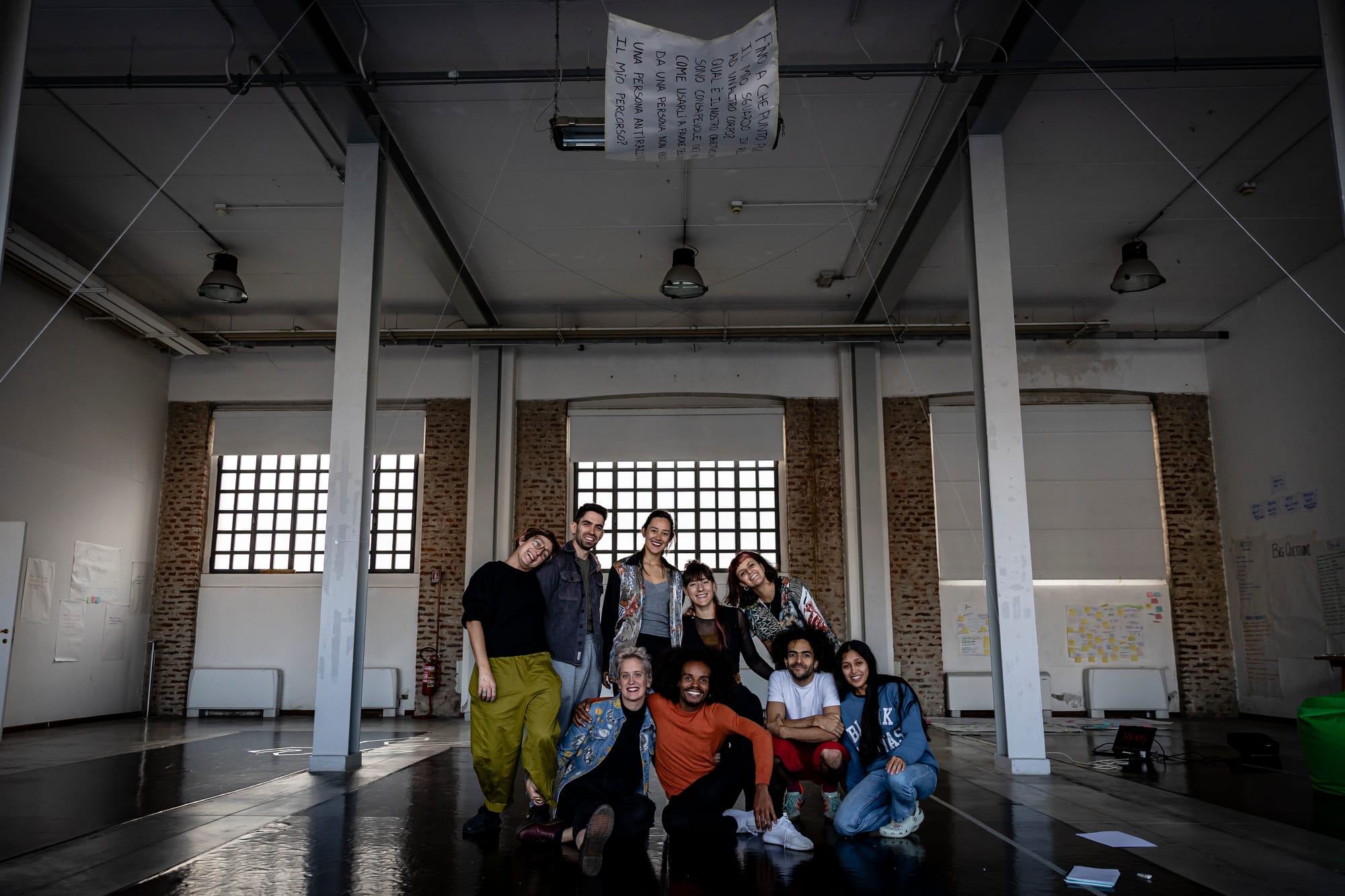
“I saw it roaring
I felt it clawing at my clothes like a grieving friend
It said
There are no new beginnings
Until everybody sees that the old ways need to end
But it's hard to accept that we're all one and the same flesh
Given the rampant divisions between oppressor and oppressed
But we are though”
(Kae Tempest, People’s Faces, The Book of Traps and Lessons)
